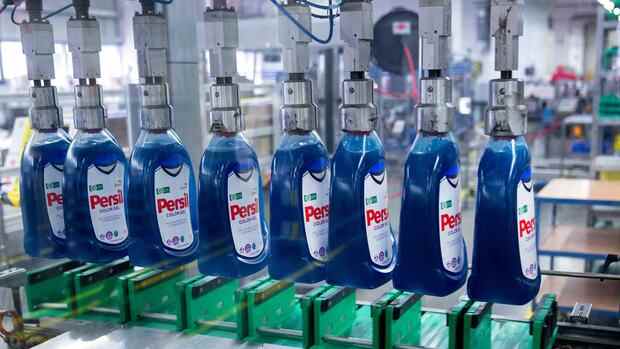The Düsseldorf group has increased its sales.
(Photo: Bloomberg/Getty Images)
Dusseldorf The consumer goods group Henkel can increase its revenues thanks to significantly higher prices. In the first nine months, the Pritt and Pril manufacturer grew organically by 9.7 percent to six billion euros. This was announced by the Düsseldorf Dax group on Tuesday morning. The group does not name key earnings figures for its nine-month figures.
In the third quarter, sales increased organically by 11.3 percent. Analysts had expected an increase of nine percent. “In an overall inflationary environment with increased raw material and energy prices, we have shown strong business development in the first nine months,” Henkel CEO Carsten Knobel is quoted as saying in a corporate statement.
Overall, however, the consumer goods manufacturer is growing somewhat more slowly than the competition. Nivea producer Beiersdorf had grown by 11.1 percent in the first nine months, the British competitor Unilever (“Dove”, “Knorr”) also increased its sales in double digits.
Many consumer goods manufacturers are increasing their sales and profits because they have been able to raise prices. This also applies to Henkel. The group had raised its prices by 11.6 percent in the first nine months. Henkel had sold fewer detergents and cleaning agents and cosmetics.
Top jobs of the day
Find the best jobs now and
be notified by email.
Because of the good development, Henkel is raising its forecast: For the year as a whole, the group now expects organic sales growth of seven to eight percent. Henkel had previously assumed an increase of between 5.5 and 7.5 percent. The company had already raised its sales forecast in the summer, and in the spring the Düsseldorf-based company still expected an increase of between 3.5 and 5.5 percent.
The competitors had also recently raised their sales targets, but they are expecting even stronger business. For example, Beiersdorf assumes an increase of between nine and ten percent.
After increasing sales, Henkel now also expects more profit. The Dax group expects an adjusted return on sales (EBIT margin) in a range between ten and eleven percent. The previous forecast was nine to eleven percent.
Adhesives business drives growth
The growth driver at Henkel was once again the adhesives business, which accounts for half of Group sales but around 60 percent of profits. The division grew organically by 13.7 percent and – unlike the consumer goods business – was also able to increase sales volumes. Henkel is the market leader in the field of adhesives and supplies car manufacturers, aircraft manufacturers, construction groups and packaging manufacturers, for example.
>> Read more: Like glues on the success of VW and Tesla decide
The detergents and cleaning agents business grew more slowly: the increase in sales amounted to 7.4 percent in the first nine months. The cosmetics segment grew by 0.6 percent, driven by prices. However, the sales volume fell by 7.5 percent. Henkel’s cosmetics business has been weak for years because it is too small and not profitable enough. Henkel is primarily active in the mass consumer goods business, which yields lower margins than, for example, the sale of high-quality face creams.
CEO Knobel is therefore currently reorganizing Henkel’s consumer division. He wants to merge cosmetics (“Dial”, “Syoss”) with the better-performing detergents and cleaning agents sector and its well-known brands such as Persil and Pril. After completion of the restructuring of the group at the beginning of 2023, Henkel should then stand on two pillars: the adhesives business and the consumer goods business called “Consumer Brands”.
The former Kellogg’s manager Wolfgang König, who will lead this division, recently addressed major inefficiencies in this area. Up to now, two Henkel salespeople have always spoken to retailers – one from the cosmetics and one from the detergents and cleaning agents sector.
In addition, employees from research and development sometimes work on the same basic technologies without even knowing about it. “It’s hard to find a company in the consumer goods sector that affords such a luxury,” he said at the group’s Capital Markets Day in September.
Henkel wants to cut 2,000 jobs worldwide as part of the restructuring of the group, 300 of which will be affected in Germany.
More: “Building a new company within the company”: what the future boss intends to do with the new Henkel division.
